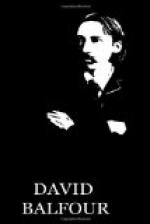I told her how much astonished I was by her genius.
“And what do you call the name of it?” she asked.
“I do not know the real name,” said I. “I just call it Alan’s air.”
She looked at me directly in the face. “I shall call it David’s air,” said she; “though if it’s the least like what your namesake of Israel played to Saul I would never wonder that the king got little good by it, for it’s but melancholy music. Your other name I do not like; so, if you was ever wishing to hear your tune again you are to ask for it by mine.”
This was said with a significance that gave my heart a jog. “Why that, Miss Grant?” I asked.
“Why,” says she, “if ever you should come to get hanged, I will set your last dying speech and confession to that tune and sing it.”
This put it beyond a doubt that she was partly informed of my story and peril. How, or just how much, it was more difficult to guess. It was plain she knew there was something of danger in the name of Alan, and thus warned me to leave it out of reference; and plain she knew that I stood under some criminal suspicion. I judged besides that the harshness of her last speech (which besides she had followed up immediately with a very noisy piece of music) was to put an end to the present conversation. I stood beside her, affecting to listen and admire, but truly whirled away by my own thoughts. I have always found this young lady to be a lover of the mysterious; and certainly this first interview made a mystery that was beyond my plummet. One thing I learned long after, the hours of the Sunday had been well employed, the bank porter had been found and examined, my visit to Charles Stewart was discovered, and the deduction made that I was pretty deep with James and Alan, and most likely in a continued correspondence with the last. Hence this broad hint that was given me across the harpsichord.
In the midst of the piece of music, one of the younger misses, who was at a window over the close, cried on her sisters to come quick, for there was “Grey eyes again.” The whole family trooped there at once, and crowded one another for a look. The window whither they ran was in an odd corner of that room, gave above the entrance door, and flanked up the close.
“Come, Mr. Balfour,” they cried, “come and see. She is the most beautiful creature! She hangs round the close-head these last days, always with some wretched-like gillies, and yet seems quite a lady.”
I had no need to look; neither did I look twice, or long. I was afraid she might have seen me there, looking down upon her from that chamber of music, and she without, and her father in the same house, perhaps begging for his life with tears, and myself come but newly from rejecting his petitions. But even that glance set me in a better conceit of myself, and much less awe of the young ladies. They were beautiful, that was beyond question, but




